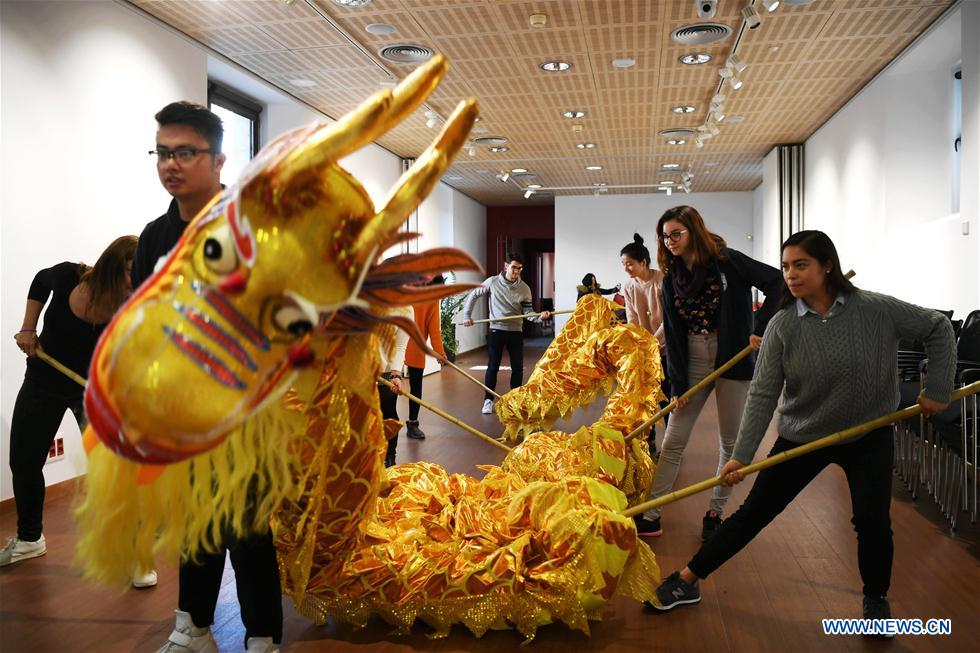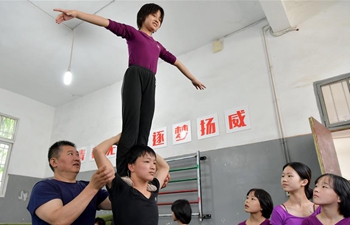
Students prepare for dragon dance at the Confucius Institute in Barcelona, Spain, on Feb. 15, 2018. In recent years, a surge in the learning of the Chinese language has been observed around the world. Confucius institutes and classrooms worldwide play an undeniable role in the process of bringing the Chinese language and culture closer to the international community.
By Xinhua writers Magdalena Stoszek-Deng, Chen Xu
WARSAW, May 31 (Xinhua) -- In recent years, a surge in the learning of the Chinese language has been observed around the world. Confucius institutes and classrooms worldwide play an undeniable role in the process of bringing the Chinese language and culture closer to the international community.
There are 525 Confucius institutes in the world, out of which 173 have been set up in 41 European countries. This shows the enthusiasm of the European people for learning Chinese and their deep interest in the Chinese culture. These Confucius institutes and classrooms use the Chinese language as a medium and culture as a bridge to help enhance friendship between people in China and Europe.
MORE THAN LANGUAGE
During this year's Chinese New Year holidays, Marcin Pilarski, a citizen of Torun in northern Poland, took his family to the local Confucius classroom, where they admired dragon dances, paper cutting and traditional Chinese calligraphy. Marcin's family also attended a Chinese language class.
"This year's Spring Festival activities have given us a close experience of Chinese culture. My children and I were very fond of it," Pilarski told reporters with excitement. To encourage his children to learn Chinese, they also signed up to become students at the local Confucius classroom.
In recent years, thanks to Confucius institutes, traditional Chinese martial arts have also entered the lives of European people.
With the help of the Confucius Institute at the Vilnius University, a Tai Chi practice rush has been recently observed in Lithuania. In 2016, 233 Vilnius citizens took part in a spectacular scene, jointly practicing Tai Chi in one place.
A WELCOME CLASS
Mateusz Adamkiewicz, an 18-year-old Polish student, has a keen interest in Chinese language and culture. Since there was as yet no Chinese language school in his hometown Torun, he began to learn Chinese by himself four years ago, using borrowed textbooks. When he learned that the first Confucius classroom had opened, he felt very lucky.
Laura Zatina, a student of the Confucius Institute at the University of Latvia, just like Adamkiewicz, is very happy to be able to learn Chinese: "Not only can you learn Chinese at the Confucius institute, but you can also apply for scholarships, summer camps and exchanges opportunities. This gives us a chance to visit China, experience culture and understand this country better," she said to Xinhua.
Moreover, the level of teaching demonstrated by the Confucius institute teachers has also been commended by European students.
In a teachers' assessment activity, held recently at the University of Helsinki in Finland, Confucius institute teachers received 98 percent positive evaluation. Some students even wrote: "Chinese class is the best foreign language class I have ever had in college."
BRIDGE OF FRIENDSHIP
The president of Portugal, Marcelo Rebelo de Sousa, had praised the role of the Confucius institute at a 2017 education exhibition in the country. He praised cultural activities conducted by the institute and expressed hope that it would continue to play an active role in exchanges between the two countries.
In 2014, the Barcelona municipal government awarded the Confucius institute with a prize recognizing its great contribution in promoting mutual understanding between Spanish and Chinese people. Subsequently, it provided the institute with nearly 1,000 square meters of free space in the city center.
According to Chang Shiru, the director of the Confucius Institute in Barcelona," "The Confucius Institute has created more than 40 job opportunities for local people since its establishment. Our students have found a good job thanks to their Chinese language knowledge, and some have also obtained Chinese language teachers qualifications certificates."
In order to fulfill her dream of becoming a Chinese language teacher, Luana Cini from Malta resigned from her job at the deputy prime minister's office and went to the local Confucius institute to concentrate on language learning. She told reporters: "I wanted to become a Chinese teacher because I like Chinese very much. I also wanted to encourage more Maltese people to learn Chinese and make friends with the people of China."
The effects of the Confucius institutes are also be seen in the young generation of European citizens. In the Polish finals of the 10th edition of Chinese bridge proficiency competition for foreign secondary school students, Katarzyna Fritz from the second high school in Krakow ranked first. In her speech, she emphasized: "I hope that the teachers and judges can remember my face and recognize me many years later, when we meet in the Chinese streets. I will definitely go to China to study and work and do my best to contribute to the exchange between our countries."
(With contributions from Guo Mingfang, Yuan Yun, Guo Qun, Li Jizhi, Guo Qiuda)















